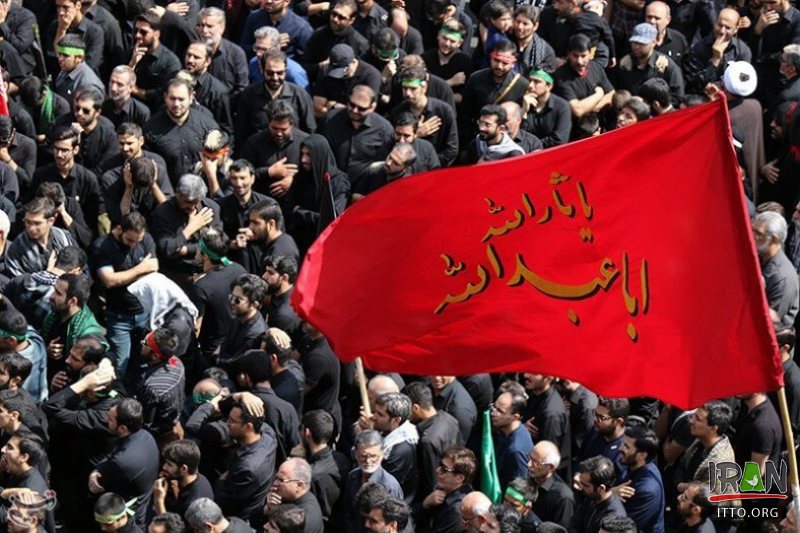Ashura is the tenth day of Muharram in the Islamic calendar.
For the majority of Shi'a Muslims, Ashura marks the climax of the Remembrance of Muharram, and commemorates the death of Husayn ibn Ali, the grandson of Muhammad at the Battle of Karbala on 10 Muharram in the year 61 AH (in AHt: October 10, 680 CE). Sunni Muslims have the same accounts of these events, however ceremonial mourning did not become a custom - although poems, eulogizing and recounting the events were and continue to be common.
Mourning for the incident began almost immediately after the Battle of Karbala. Popular elegies were written by poets to commemorate the Battle of Karbala during the Umayyad and Abbasid era, and the earliest public mourning rituals occurred in 963 CE during the Buyid dynasty.
In Afghanistan, Iran, Iraq, Lebanon, Azerbaijan, Bahrain, India and Pakistan, Ashura has become a national holiday, and many ethnic and religious communities participate in it.
In Sunni Islam, Ashura also marks the day that Moses and the Israelites were saved from Pharaoh by God creating a path in the Sea, and is the Islamic equivalent to Yom Kippur. Other commemorations include Noah leaving the Ark and Muhammad's arrival in Medina.
Etymology:The root of the word Ashura has the meaning of tenth in Semitic languages; hence the name of the remembrance, literally translated, means "the tenth day". According to the orientalist A. J. Wensinck, the name is derived from the Hebrew ʿāsōr, with the Aramaic determinative ending. The day is indeed the tenth day of the month, although some Islamic scholars offer up different etymologies. In his book Ghuniyatut Talibin, Sheikh Abdul Qadir Jilani writes that Islamic scholars differ as to why this day is known as Ashura, some of them suggesting that it is the tenth most important day with which God has blessed Muslims.
Battle of Karbala:The Battle of Karbala took place within the crisis environment resulting from the succession of Yazid I.
Immediately after succession, Yazid instructed the governor of Medina to compel Husayn and a few other prominent figures to pledge their allegiance.
Husayn, however, refrained from making such a pledge, believing that Yazid was openly going against the teachings of Islam and changing the sunnah of Muhammad.
He, therefore, accompanied by his household, his sons, brothers, and the sons of Hasan left Medina to seek asylum in Mecca.
On the other hand, the people in Kufa, when informed of Muawiyah's death, sent letters urging Husayn to join them and pledging to support him against the Umayyads. Husayn wrote back to them saying that he would send his cousin Muslim ibn Aqeel to report to him on the situation, and that, if he found them united as their letters indicated, he would speedily join them because an Imam should act in accordance with the Quran and uphold justice, proclaim the truth, and dedicate himself to the cause of God. The mission of Muslim was initially successful and according to reports 18,000 men pledged their allegiance. But the situation changed radically when Yazid appointed Ubayd Allah ibn Ziyad as the new governor of Kufa, ordering him to deal severely with Ibn Aqeel. Before news of the adverse turn of events had reached Mecca, Husayn set out for Kufa.
On the way, Husayn found that his messenger, Muslim ibn Aqeel, had been killed in Kufa. Husayn encountered the army of Ubaydullah ibn Ziyad along the route towards Kufa. Husayn addressed the Kufan army, reminding them that they had invited him to come because they were without an Imam. He told them that he intended to proceed to Kufa with their support, but if they were now opposed to his coming, he would return to where he had come from. In response, the army urged him to proceed by another route. Thus, he turned to the left and reached Karbala, where the army forced him not to go further and stop at a location that was without water.
Ubaydullah ibn Ziyad, the governor instructed Umar ibn Sa'ad, the head of the Kufan army, to offer Ḥusayn and his supporters the opportunity to swear allegiance to Yazid. He also ordered Umar ibn Sa'ad to cut off Husayn and his followers from access to the water of the Euphrates. On the next morning, Umar ibn Sa'ad arranged the Kufan army in battle order.
The Battle of Karbala lasted from morning to sunset on October 10, 680 (Muharram 10, 61 AH). Husayn's small group of companions and family members (in total around 72 men and the women and children) fought against a large army under the command of Umar ibn Sa'ad and were killed near the river (Euphrates), from which they were not allowed to get water. Once the Umayyad troops had murdered Husayn and his male followers, they looted the tents, stripped the women of their jewelry, and took the skin upon which Zain al-Abidin was prostrate. Husayn's sister Zaynab was taken along with the enslaved women to the caliph in Damascus when she was imprisoned and after a year eventually was allowed to return to Medina.


